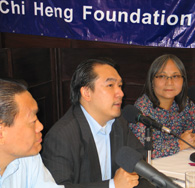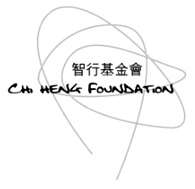Gay and lesbian issues are getting better coverage in Hong Kong's Chinese-language media, says prominent activist To Chung, but while the tone has shifted from "negative" to "neutral," a misinformation campaign by anti-gay elements is threatening to derail the push for equal rights.

From right: Rose Wu, director of the Hong Kong Christian Institute and one of the judges; Chung To, activist and founder of the Chi Heng Foundation; and Albert Luk, coordinator of the Chi Heng Foundation at the launch of the 4th Tongzhi media Awards in Hong Kong on Sunday at the Foreign Correspondents' Club.
The awards, conducted in partnership with the Hong Kong Journalists Association, aim promote better community-wide understanding of gay and lesbian issues, in particular the right to fair and equal treatment before the law.
"We want to acknowledge journalists' efforts in raising awareness about Tongzhi issues in Hong Kong and to encourage media organisations to cover Tongzhi issues," said Albert Luk, coordinator of the Chi Heng Foundation.
To said he was concerned about the level of misreporting in the Hong Kong media, some of which lends credibility to religious fanatics who "relate homosexuals to animals and enemies of human beings."
"While we do respect different religions, we also hope religious groups would respect the human rights and freedom of those who don't share the same religion as theirs," To said. "Words in their Bible are not law and they should not impose their Bible upon others who do not believe in their religion."
Fundamentalist Christians, operating behind an organisation called the Society for Truth and Light, have been mounting an intense campaign to prevent any attempt to extend equal rights to homosexuals in Hong Kong.
A recent court ruling that struck down unfair age-of-consent laws that made it a criminal offence punishable by up to 25-years imprisonment for two men to have sex if one of them is under the age of 21 - the age of consent for heterosexuals is 16 - is now being appealed by the government.
This comes despite repeated assurances from senior government officials to the Tongzhi community that the decision of the courts on issues relating to gays and lesbians in Hong Kong would be respected.
The grounds for the appeal are moral, rather than legal, and relate to sodomy, which is not a crime in Hong Kong.
The Court of Final Appeal ruled that the age-of-consent law was discriminatory and contravened the Basic Law, Hong Kong's mini-constitution put in place when the former British colony reverted to the sovereignty of mainland China in 1997.
"The judgement was supposed to reinstate the rights of equal opportunity for homosexuals, consistent with the spirit of the Basic Law and other declarations on human rights," To said.
Fundamentalists groups have been waging a media war on the Tongzhi for some 18 months, ever since the government indicated it was open to consider introducing legislation that would protect people from discrimination on the grounds of sexual orientation.
After more than 18 months of discussion, the Home Affairs Bureau has yet to conduct a survey to gauge the attitude of the Hong Kong public towards homosexuals, a survey increasingly being seen as a prerequisite for any further action on gay and lesbian rights.
Full-page advertisements have been appearing on a regular basis in the broadsheet Ming Pao newspaper, as well as other Chinese-language publications, in an extremely costly campaign that effectively smears homosexuals as mentally ill sexual deviants who molest children.

Formal complaints are also being considered about the announcement this week that the Society for Truth and Light had been awarded a contract by the manpower Resources Department to educate schoolteachers about human rights.
Meanwhile, gays and lesbians are quietly testing the law concerning recognition or otherwise of same-sex partnerships, with at least one gay couple married earlier this year in Vancouver securing recognition of their status by taxation authorities.
This comes as a high profile case expected to determine Hong Kong law on recognition of same-sex marriage moves slowly through the courts. Supporters of that case do not expect a speedy decision, nor are they confident the government will abide by the court's decision.
Already, multinational companies are also increasingly granting same-sex partner benefits to local gay and lesbian employees.
And a special visa class has also been created for non-working same-sex partners of expatriates working in Hong Kong, though immigration authorities are understood to require a six-monthly review of the person's status to ensure he or she is not engaging in employment, which comes under a different visa.
However, these are not stories that will be found in the Chinese-language press, in part because of the reluctance of journalists to take on often conservative editors but largely due to the failure of gay and lesbian activists to establish a relationship with the media.
Curiously, past winners of Tongzhi Media Awards are not lobbied to continue their coverage of gay and lesbian issues, and journalists are rarely briefed on issues as they develop.
To said "coverage of Tongzhi issues has increased" because of recognition conferred by the awards.
"The attitude and the choice of words has been changing from negative to more neutral, or even positive and supportive.
"We are proud of what we have done, which has resulted in positive changes in the community," To said, adding: "In a long run, we are optimistic towards our future."
Nomination forms for the 4th Tongzhi Media Awards are available from www.mediaawards.com.hk or www.hkja.org.hk.
Judges include Ms Rose Wu, director of the Hong Kong Christian Institute, Sinologist Professor Li Dun, Dean of Communications at the HK Baptists University, Professor Georgette Wang, and Professor Johannes Chan, dean of Law at the University of Hong Kong.
